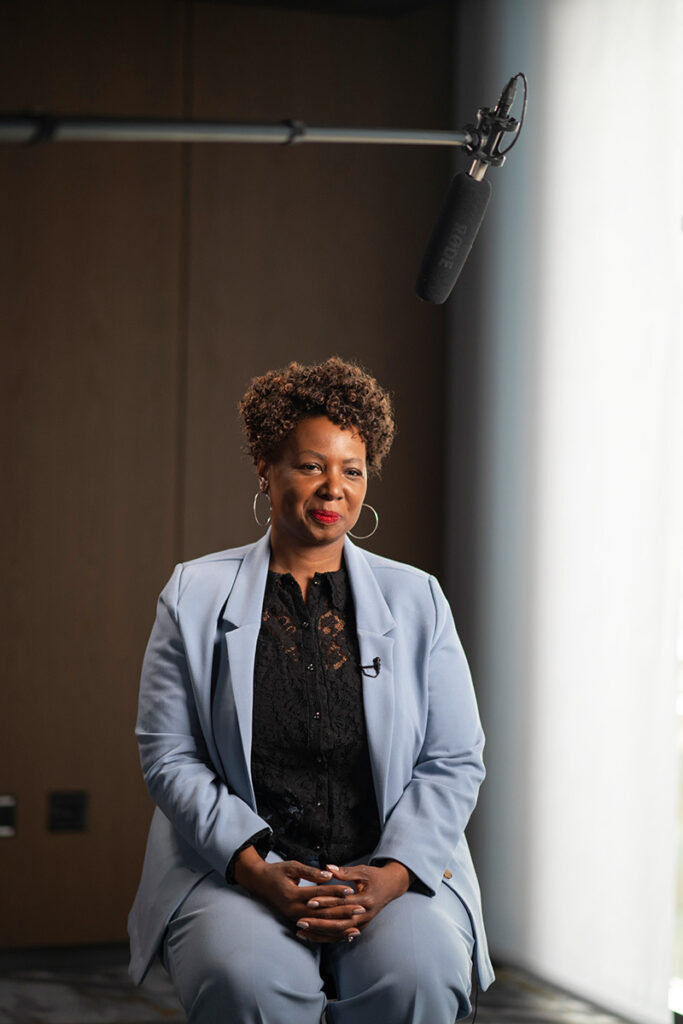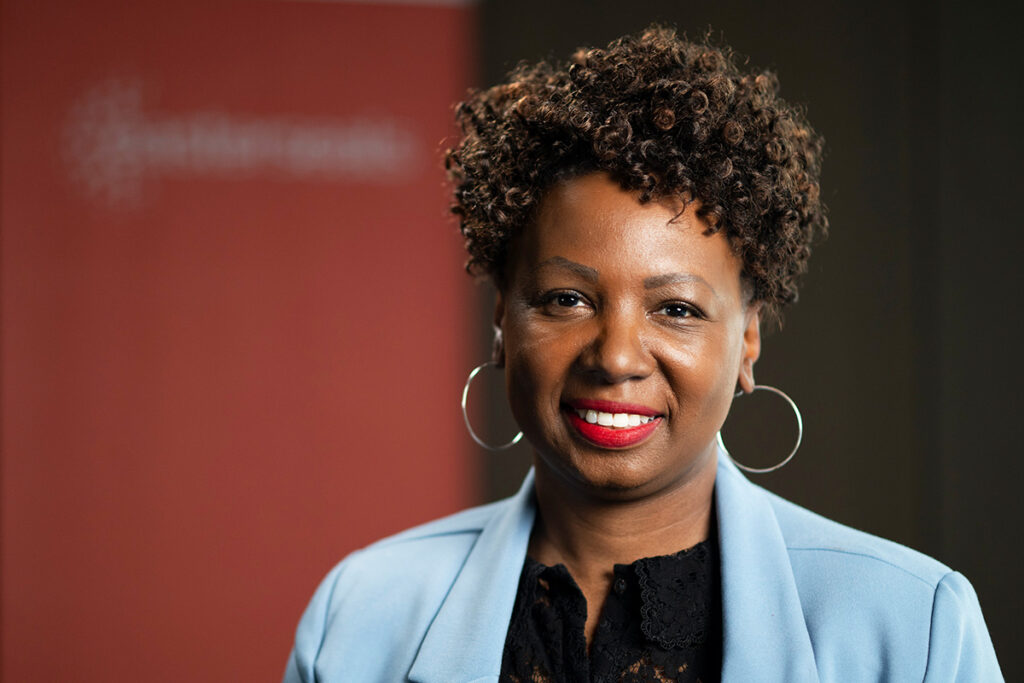Bridging Employment Gaps for Veterans and Older Americans: An Interview with SCSEP’s Crystal Odom-McKinney
by Blog Writers

Crystal at the 2024 Policy and Partnership Forum. Easterseals Photo by Rohanna Mertens
Crystal Odom-McKinney is the National Director for the Easterseals Senior Community Service Employment Program (SCSEP). SCSEP is the largest federally-funded program for low-income, unemployed adults, ages 55 and older, who seek employment and training assistance as well as civic engagement.
Through this transitional employment program, Easterseals partners with community-based nonprofit organizations and government agencies to provide participants with training opportunities to update their skills. During time in SCSEP, job seekers work with Easterseals staff to target and achieve personal employment goals. Some SCSEP participants are veterans in need of support.
As a veteran, Crystal knows how hard it can be for veterans to transition from military service back into civilian life. Finding employment can be difficult and stressful, and for disabled veterans, or older veterans, these barriers to employment and reintegration can be even more prominent. Easterseals and its Affiliates work hard to provide much needed-support to veterans during and after this period of transition. Crystal takes pride in providing confidence to veterans as they make this next step in their journey.
This interview has been edited for clarity.
[Q] Easterseals just worked with Voya Cares on a new set of research looking at financial security for veterans and caregivers and interviews with employers. How is Easterseals responding to some of the challenges on those subjects?
[A] Easterseals is responding through training and support of employment within our networks. We work directly with partners in communities and with job seekers across the country to give them the tools that they need to be successful in the workplace.
[Q] What are some of the services that Easterseals provides to veterans and military families?
[A] We provide training to job seekers in the communities that we serve. We also connect them with employment opportunities, and those employment opportunities can vary based on your skill set. And lastly, we connect with businesses and employer champions so that they understand the value of job seekers and our communities.
[Q] What are some of the impacts that these programs have for the individuals and families involved? And is there a story from your experience that you’d like to share?
[A] Sure, I’ll start with the impact. The impact that our services provide to veterans and their families is definitely around a sense of confidence and pride. Many people come to our programs without hope.
And when they leave, they leave with lots of hope due to the various supports that are provided through skill building for employment, through training, training supports, through resources — because there is a huge need of resources for job seekers in all of our programs. There’s also connection, which builds confidence. It’s very difficult for someone to look for employment opportunities when you don’t have the proper resources in place.
You have to minimize those bumps in the road, and that’s very important. If you cannot get up and have a place of shelter, if you don’t have the economic means to transfer back and forth to work, if you don’t have education or enough of it, if you don’t have skills or need skills to become more employable … We work with people to minimize those barriers … to help make them stronger and make them better. In return, this allows their confidence to be uplifted a lot.
[Q] I was curious. Is there a story or experience you’ve had that relates to this?
[A] Sure. I would like to share a recent story. We had a job seeker in Ohio who had been out of work for some time and really needed some support in getting back into the workplace. The job seeker was roughly in their mid seventies. And they found out about our Easterseals training programs and through those training supports, they were able to get computer training.
They were also able to connect with other job seekers, which again, goes back to the confidence building. That’s often really important. And then ultimately, you know, get employed and get reemployed into the workplace. So that’s one of many stories that we see out here. And that’s why we really encourage the whole confidence builder in what we do every day.

Easterseals Photo by Rohanna Mertens
[Q] That’s fantastic. The Voya survey included interviews with employers. I’m just curious, can you tell me what Easterseals does when working with employers who are interested in hiring veterans?
[A] Easterseals connects employers with interested job seekers through connections across our national Affiliate network. One thing that’s very important is for employers to understand the value veterans bring to the workforce. So we share lots of stories of how job seekers are impacted by this work.
We also share how a job seeker may transition into employment at that particular company. We have what we call, “employer champions,” and they are amazing employers that get it. They love the work that we do at Easterseals and are very aligned with the mission and the vision.
They also are willing to go above and beyond — through their training, through their workshops — and that translates into essential resources for people looking for employment.
So, employers not only open up job opportunities and say, “Well, we’ll hire veterans,” or “We’ll hire people with disabilities.”
These employers actually get it, and they can come in and walk side by side with us. They’re willing to interview people and they’re willing to create programs at their companies that will connect job seekers directly into employment opportunities at their organization. They are our champions.
Champions who are willing to hire mature job seekers, champions who understand the value of a mature worker, champions who understand the reliability and the dependability and the experience that a mature worker brings to their workforce.
From our champions, we share the good stuff that they do with other companies that may be interested. So it’s sort of like carrying courtship. We definitely want to court other businesses to be champions, and we also want to share the good things that are out there.
Sometimes we’re very successful; sometimes it just takes a little work. The end result is definitely in the impact for the people that we serve. And it’s a win-win-win.
[Q] I’m curious, is there a particular success story about a job seeker and an employer that you’d like to share?— about job seekers with a disabilities or a veteran with a new position?
[A] I’m thinking of someone who was recently employed at a school, and worked as a trainer connected at that school, and ultimately was hired there as a school aid. And I was there on site when they offered her the position. She was very excited and it was just a really wonderful memory. She started as a school clerk a little later in life, and she did well and ultimately got that job.
Unrelated to veterans or disability, we had another job seeker who was incarcerated for two decades, and this individual came to our program with little to no hope. As a result of being retooled and retrained into the Easterseals SCSEP program, he was employed full time. And since that time, he’s been promoted to two additional positions and two additional roles at his company.
[Q] So one of the things that came through in the recent study is that just half of disabled veterans feel comfortable in their ability to cover day to day expenses, which I think is sort of a jaw-dropping number for a lot of people. What programs does Easterseals provide to veterans and military families to help address this?
[A] We have lots of offerings, both in person throughout our Affiliate network and in virtual training.
We also provide resources related to the other wraparound services — such as housing, such as child care, such as financial planning. Of course, through lots of connections that we have out there, including Freddie Mac. And our other local partners also provide upskilling and training support.
If there’s someone who needs additional support in returning to work, we negotiate with employers to offer internship opportunities where they can learn as they earn. And we create those types of partnerships with employers as well as community colleges and other nonprofit organizations.
[Q] One of the things we’ve talked about is people who didn’t have a sense of confidence … you’ve really helped to bring them up, and made them feel seen and heard and understood at a time of their life when they needed that kind of support. There are a lot of services that Easterseals provides that are life-changing. Can you talk about the confidence piece some more?
[A] Yeah, you know, I have so many stories … as it relates to confidence. We talk about the psychology of feelings, and the psychology of how you feel, and we all know that when we’re confident, we’re confident. When we feel good, we thrive, we do better.
And a lot of our mature job seekers, and a lot of job seekers in all of our programs really come to us with no hope. They’re at their darkest. They don’t have a lot of resources. They feel like they don’t have anything. I’ve traveled to some of our locations where we’ve had job seekers who are homeless and they sleep in their car, and they didn’t want to get an apartment because their dog couldn’t stay.
We sense a lot of this hopelessness in the work that we do. And we work with them, you know, day by day to instill better confidence in them …to let them know that they’re valued and to let them know that step by step, day by day, we can help them to minimize those bumps in the road.
Maybe they’ve been told “no” by so many people, but we want them to know and understand that we’re here to support them. We have them in that sense. So that’s where the confidence building comes in. And it’s sort of a domino effect, because if we were in a room full of people, and we have people who are feeling good about themselves, by the time we leave the room, everyone else will feel better.
This relates to our job [in SCSEP]. This might be around mental wellness. This could be around financial well-being — any of the topics. If we talk about these circles of support that we provide to people, we can help them move forward and they can get stronger. They’re more confident, and they can move mountains, and they can be better at what they do.
Stories like these put fires in [our teams’ bellies], and fires them up in a good way to keep being change agents in the communities that they serve.






